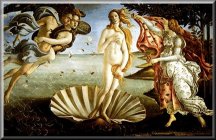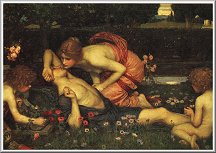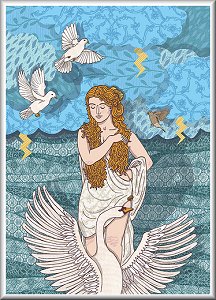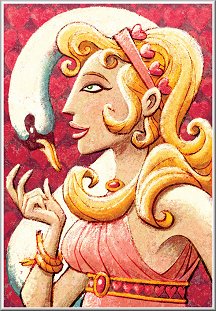APHRODITE, GODDESS OF LOVE
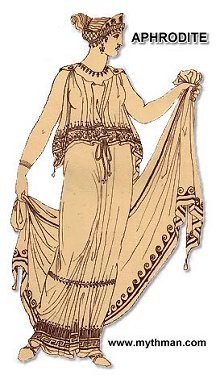
LATIN - VENUS
PAGE ONE
In addition to her irresistible looks Aphrodite had a magical golden girdle, made by Hephaestus, that when worn compelled anyone she wished to desire her.
Later myths and poems say that the goddess of
Love had risen from the sea foam on a seashell after Cronus tossed his
father Uranus' severed genitals there.
Her name was thus explained as "foam-risen" coming
from the Greek word 'Aphros', which means 'foam'.
Both Aphrodite and the Queen of the Underworld,
Persephone, loved a handsome young mortal named Adonis. The two
goddesses created such a stir that Zeus was asked to decide Adonis'
fate. Zeus ruled that Adonis could spend one-third of the year with
Aphrodite, one-third with Persephone, and the other third was his to do
as he wished.
Needless to say, Adonis chose to spend his own time with Aphrodite,
until he was gored to death by a wild boar (some say it was Ares, the
jilted lover, who killed Adonis in the form of a boar).
Aphrodite wasn't all lovey-dovey. She could be harsh to those who defied her. Because the Lemnian women did not honor her, she inflicted a foul smell on them and caused their husbands to consort with Thracian women. The Lemnian women, abandoned by their husbands, killed all the men on the island and established a society of women.
Aphrodite was the ancient Greek goddess of Beauty, Love, Fertility and Desire. She was one of the Major Olympians and played a dramatic role throughout ancient history, featuring in countless myths and stories. Aphrodite was - and is - quite fascinating, for many reasons!
Her parentage is uncertain. The poet Homer, in the epic poem called the 'Iliad', claimed that she was the daughter of Zeus and the Titaness Dione. She may also have been a daughter of Amphitrite by Triton or perhaps Cronus, father of many Olympians. Many versions of her origin exist.
But later myths and poems say that the goddess of Love had risen from the sea foam on a seashell after Cronus tossed his father Uranus' severed genitals there. This is the most widely accepted take, but depending on the source, any of these versions may be considered accurate.
Her name was thus explained as "foam-risen" coming from the Greek word 'Aphros', which means 'foam'.
The actual "sea-birth" is said to have taken place near the island of Cythera, but supposedly she first walked ashore on Paphos in Cyprus. The South Wind claimed to have seen her floating in a scallop shell off the island of Cythera, and steered her gently ashore.
That's the reason why she was called 'The Cyprian' or 'Cytherea' as often as by her proper name.
The Horae (Hours, Seasons) welcomed her joyously and clothed and attended to her, hanging golden ornaments in her ears and adorning her with golden necklaces. They put on her head a crown of gold and then the Horae brought Aphrodite to Mount Olympus, to be introduced to the Olympian gods.
HOMERIC HYMN TO
APHRODITE
The breath of the west wind bore her
Over the sounding sea,
Up from the delicate foam,
To wave-ringed Cyprus, her isle.
And the Hours golden-wreathed
Welcomed her joyously.
They clad her in rainment immortal,
And brought her to the gods.
Wonder seized them all as they saw
Violet-crowned Cytherea.
Aphrodite each year would return to Paphos, in Cyprus, and swim in the sea for good luck and to rejuvenate herself.
Robert Graves, in his book "Greek Gods and Heroes", tells us that "Aphrodite's throne was silver, inlaid with beryls and aquamarines, the back shaped like a scallop shell, the seat made of swan's down, and under her feet lay a golden mat -- an embroidery of golden bees, apples, and sparrows."
The poets liked to paint an idealistic picture of Aphrodite, filled with beauty and happiness - The winds flee before her and the storm clouds; sweet flowers embroider the earth; the waves of the sea laugh; she moves in radiant light. Without her there is no joy nor loveliness anywhere.
However, in the Iliad, the story of the Trojan War which praised brutal strength and power as heroism, she was shown as a soft and weak creature, whom even mortals could attack, and even wound in battle.
Aphrodite wasn't always sweet. When it suited her, she could be rather malicious and treacherous, and her influence over men was often deadly. She could turn the heart of any man to longing and passion, and it was said that when she spoke, even Zeus listened...after all, the King of the Olympians was notorious for succumbing to Love's temptations.
The lame god of the forge and metalworking, Hephaestus, was her husband, although he was the only god to be physically ugly. It was an arranged marriage - Some say that when Aphrodite first arrived on Mount Olympus, Zeus was struck by her beauty and radiance and he was certain that the other gods would fight for her affections. So he awarded Aphrodite to the most dependable and steady deity, Hephaestus.
Needless to say, Hephaestus considered himself the luckiest god on Olympus and he did his utmost to please his gorgeous bride, continuously creating and designing new golden jewelry and furniture to please her. In addition to her irresistible looks Aphrodite had a magical golden girdle, made by Hephaestus, that when worn compelled anyone she wished to desire her.
As if she weren't irresistible enough already!
But Aphrodite considered it shameful and a disgrace to be the wife of such a "blue collar", manual-labor kind of god. Hephaestus was unattractive, sooty-faced, hard-working, crippled and not quite the "party animal" that his wife was, and she insisted on having a bedroom of her own, separate from his.
The Three Fates assigned to Aphrodite one divine duty only - to make love. Tough work, but someone's got to do it! According to the writer Hesiod, however, one day Athena caught Aphrodite secretly at work on a loom, weaving some colorful cloth. Athena complained that Aphrodite had infringed on her own duties and threatened to abandon them altogether. Aphrodite proceeded to apologize profusely to Athena and has never done any work since.
Opposite Aphrodite high on Mount Olympus sat the god of War, Ares, and the two had an ongoing notorious love affair that scandalized all of Olympus. Ares and Aphrodite were always holding hands and giggling in the corners of the palace, which made her husband Hephaestus very jealous.
One night the two lovers stayed a little longer in bed and when Helios, the Sun God rose and saw them, he proceeded to tell Hephaestus. The jealous husband then fashioned an invisible bronze hunting net and captured the two lovebirds, but when he assembled the Olympians to render judgment, they wanted nothing to do with punishing them. Zeus even told Hephaestus that he was stupid to make such a golden girdle for his wife, and that he shouldn't be surprised that men could not resist her.
Aphrodite had three children by Ares - Phobus, Deimus and Harmonia. She pretended these were her husband's and presented them as such to Hephaestus.
Aphrodite wasn't very faithful to her husband, to say the least. Some of her other lovers included Dionysus, god of wine, the messenger god Hermes, and the King of the Sea, Poseidon. Two of her more famous mortal lovers were Adonis and Anchises (see below).
Aphrodite "thanked" Hermes for not taking her husband's side when she was caught with Ares by spending the night with him. The result was Hermaphroditus, a double-sexed being.
Equally grateful to Poseidon for siding with her, Aphrodite bore him two sons, Rhodus and Herophilus. But Hephaestus was so in love with his wife that he chose to overlook her numerous indiscretions. She was the goddess of Love, after all!
Aphrodite's union with Dionysus produced Priapus, a horribly ugly child with enormous genitals. This revolting and obscene appearance was a punishment from Hera, wife to Zeus, who disapproved of Aphrodite's promiscuous ways.
![]()
APHRODITE PAGE CONTINUES
HERE!
APHRODITE PAGE TWO, WITH A TON
OF ADDITIONAL INFORMATION - NEW!
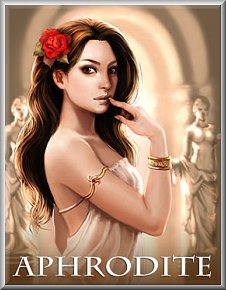
The poets liked to paint an idealistic picture of Aphrodite, filled with beauty and happiness - The winds flee before her and the storm clouds; sweet flowers embroider the earth; the waves of the sea laugh; she moves in radiant light. Without her there is no joy nor loveliness anywhere.
Aphrodite wasn't always sweet. When it suited her, she could be rather malicious and treacherous, and her influence over men was often deadly. She could turn the heart of any man to longing and passion, and it was said that when she spoke, even Zeus listened...
The lame god of the forge and metalworking, Hephaestus, was her husband, although he was the only god to be physically ugly...Needless to say, Hephaestus considered himself the luckiest god on Olympus.
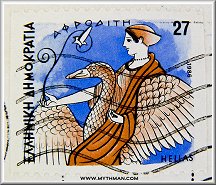
GREEK APHRODITE STAMP
CLICK TO ENLARGE

[HOME] [MYTHOLOGY'S EFFECTS ON
MODERN SOCIETY][OLYMPIANS]
[GALLERY] [MAJOR
GODS] [MINOR
GODS] [HEROES]
[CONTACT]
[LOVE STORIES]
[MYTH OF THE MONTH]
[FUN STUFF] [CREATURES]
Web, myth narration and graphics created and
maintained by Nick Pontikis
Copyright © 1995 Nick Pontikis
Thanasi's Olympus Greek
Restaurant
Copyright 1999
mythman.com
greekmythologytoday.com
mythmaniacs.com
The Myth Man persona copyright 1988 Nick Pontikis


